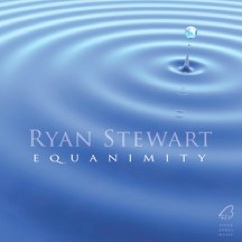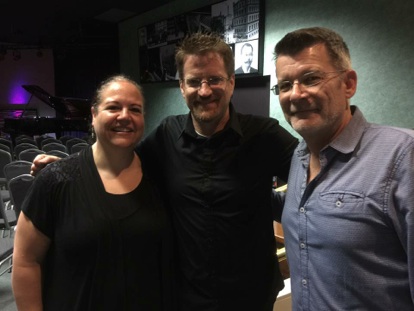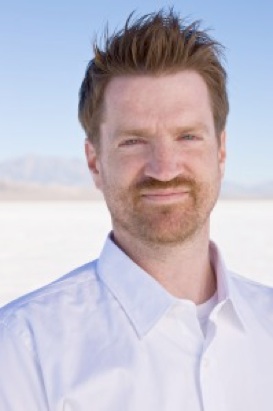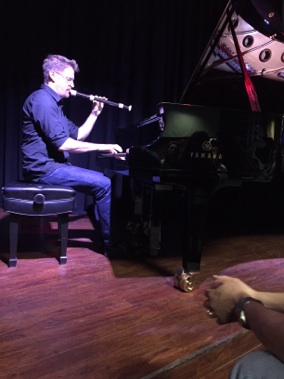The concise confident uncomplicated compositions of Ryan Stewart lets us peek into the world of his piano storytelling.
Composer, arranger and pianist Ryan Stewart released his highly impressive debut recording
Equanimity back in 2008. But he first came to my attention when he appeared not only as a player on Paul Cardall’s 2001
Miracles but also credited as the associate producer. He also co wrote the sublime title track of the same album. Cardall returned the favor as Executive Producer as well as providing Stewart with a recording label. Since then Stewart has stepped out on his own and recorded two additional albums of original material as well as the more recent interesting compilation
Memories.
After only completing three releases it almost seems pretentious for your average artist to be releasing a “best of” on your fourth creation. However, Ryan Stewart and
Memories is neither your average artist nor your typical “best of” respectively. This time around Stewart stripped down his music to the very core featuring just the man and his piano making
Memories exceedingly memorable.
The discography of Ryan Stewart is filled with concise and confident compositions that are rich in uncomplicated detail, melody and passion making him one of the most memorable pianists in recent years. Now three complete albums of original material along with the compelling compilation Ryan Stewart continues to impress. With a five concert trip to Texas completed recently the piano was very gracious to find an opportunity to take on an interview for Mainly Piano.

Click the album covers to read Michael's reviews.
MD: Your biography states that your mother was a classically trained pianist who passed away early in your childhood. What effect did her musical background and unfortunate passing have both on your childhood and musical roots?
Ryan: It was everything for me. My mother started me on piano playing classical music at age seven. I didn’t like music and didn’t want anything to do with it. I would get angry that I wasn’t able to play outside with my friends. However, when I turned eight, my mother was diagnosed with breast cancer. She passed away when I was thirteen. This was a very difficult time for me. I realize that the gift of music which she instilled into me was the thing that enabled me to get through this most difficult time. She became the music and inspiration in my life in these dark days.
MD: While many may be familiar with your recording debut Equanimity back in 2008 let’s go back even further to the year 2001 when you appear on Paul Cardall’s Miracles. What is the story behind that?
Ryan: Being good friends with Paul, he asked me if I would be interested in doing an orchestration project for him. Of course I said yes and was very excited about this. We went through several of Paul’s ideas, themes, and songs and I went to work. I took one of his themes and weaved it with one of my own. This is how I came up with the opening song on Miracles. It was a privilege to work with Paul on this project.
MD: A perusal of your website does not fill in a lot of details so what happened between your 2001 appearance on Cardall’s album and your very impressive debut in 2008. Care to share?
Ryan: My first daughter was born in 2001. My second daughter was born in 2004. I worked a full-time job as a senior computer engineer and worked on various music projects on the side when time permitted. I was very busy with a new family. However, I realized I wasn’t getting any younger. Thanks to my wife’s encouragement and support, Paul’s support, and the help of several others, I was able to finally release my first album.
MD: Your debut was very impressive and also has the elements of an unassuming and understated soundtrack. Was this an intentional creative move? Do movies have some sort of profound effect on your musical creativity?
Ryan: Something has always drawn me to soundtrack music. I have always loved what a soundtrack does for a film. The music has such a dramatic effect upon the film. Also, I’ve played for several dance studios where music is combined with motion and movement as in a film. Having an entire palate of instruments as opposed to only piano greatly enhances the range of emotional power that can be drawn from the diverse timbre. So, perhaps the intent was subconscious. I definitely can say I love the many soundtracks out there. Hopefully one day I’ll be able to score a major film. Until then, I can provide a soundtrack to my life and my experiences.
MD: Equanimity also includes the rather reflective composition “Released” which is dedicated to your sister in law who passed away after her battle with breast cancer. Was this during the recording sessions? How did you cope with this?
Ryan: This was a very difficult time for my wife and me. We were very close to my sister-in law Susan and her family. At the time of her breast cancer diagnosis, she was only twenty nine years old and had a four year old son and six month old twins. My mother was not as young as her but still young at age forty leaving ten children behind when she passed away. In a way it was like reliving the memories of my mother’s cancer all over again. The song “Released” came about when I was driving in my car and, out of nowhere, came the melody for this song. Susan had died two days before this and we were in the full mourning period of losing her. I’m actually dumbfounded this song came about when I was driving. It is as if Susan directly spoke this song to me
MD: At the time of your debut recording your full time occupation was as a computer architect with an emphasis on banking and internet programming. Is this still the case or have you managed to make the move to a full time musician?
Ryan: I’m proud to say that after several years of hard work and perseverance, I was able to make the transition from a full-time computer architect to a full-time musician. This is a dream come true. Making this transition was scary since I was moving from a very secure paycheck to a world where there are so many unknowns. However, I have now been doing the full-time gig for over a year and have no regrets. There is no doubt that it is hard work. However, it is the BEST thing I could have ever done.
MD: Despite the high caliber debut you followed up two years later with the equally impressive follow up In the Dreaming Hour. Upon revisiting this album for this interview the album was somewhat more reflective and less optimistic than your debut. Was that life reflecting art?
Ryan: I have so much music inside me. It was a challenge to pick what to use. I intended for In the Dreaming Hour to have more of a melodic and sophisticated set of songs. I wanted to create an album with the full bodied richness that was found in Equanimity yet I wanted songs which carried more classical and contemplative harmonies. For this album, it wasn’t so much a life reflecting art as it was a focus on melody and themes.
MD: Your debut was recorded on Paul Cardall’s label Stone Angel Music while your second album was an independent recording. What were the driver(s) behind this decision?
Ryan: Stone Angel Music laid the foundation for my first album. From that point on, I began learning a lot about the music industry through workshops, classes, and books. I learned how the internet has impacted and changed so many aspects in the music industry. I discovered a myriad of companies and technologies that facilitate the creation and distribution of music and came to realize just how easy it is to get music distributed to the world to places like iTunes, Amazon, CDBaby.com, etc… I was anxious to get my music released and, because of these companies and technologies, I felt confident in releasing an album on my own
MD: In the year 2014 you released your third album One Journey that featured in my opinion one of your ultra top shelf composition “When We Met”. While I will not ask you the unfair question of which song is your “favorite child” I would like to know what you drew upon for inspiration for this particular song.
Ryan: “When We Met” is a very special song for me. This song celebrates relationships and how they originated. It could be the meeting of your child at birth, your pet, or your best friend. You fill in the blank. For me, it was inspired from my college days when I met my wife, the most amazing person and friend in my life. My college years were full of so much spontaneity, freedom, and discovery. It was a very magical time of my life. The theme of this song also originated during that time.
MD: Of the albums of original material it appears that One Journey has essentially has been the mellowest of your recordings to date. Was this intentional and if so why?
Ryan: I simply wanted to capture a very intimate sound which reflects the original raw moments at my piano. For the pieces which have both piano and other orchestral elements, I wanted there to be an equal balance between the two. Therefore, I didn’t want the other instruments to be overbearing and detract from the original raw piano parts. I felt that sparseness sometimes added more to paint the desired picture than to lay down a full-bodied thick string sound. One Journey has more of an art reflecting focus on my life than my other albums.
MD: It was followed up by the very presumptuous move of recording a best of after only recording 3 albums of original material. With you recording on your own label there was no need to fulfill a recording contract. Why so early?
Ryan: Perhaps it was a bit presumptuous to release a “best of”. In any case, fans have been requesting piano sheet music for many of these songs. Therefore, I thought it would be a great idea to give these listeners an intimate solo piano CD while also providing them with a song book to accompany the new CD. By labeling the album as a “best of”, listeners would know the material was derived from my first three albums rather than containing a whole new set of compositions.
MD: As it turned out you focused on a complete stripped down rendition of your past catalog. Was this a one off presentation to introduce a new audience to your past catalog or is this a reflection of where you would like to go for future recordings?
Ryan: The intention was two-fold as my listening audience seems to be a mix of people who either love solo piano compositions and/or full instrumental compositions. My first three CDs contained songs which are solo piano and instrumental. Providing a purely solo-piano CD is a great way to reach fans who love music to this end while also introducing new listeners to my past catalog. Since my passion runs deep for the multi-timbre elements of such and since I consider myself to be an instrumental recording artist, I can promise that you’ll see more instrumental albums from me down the road.
MD: You have just finished a small tour/store appearances in the great state of Texas when I also had the pleasure of meeting you. Why was Texas so fortunate to be chosen and do you foresee additional dates and appearances?
Ryan: For the longest time, people have asked me if I was going to perform. I have several family and friends who live in Texas and therefore felt Texas would be a great place to begin such an adventure. Knowing that Michele McLaughlin also had not been to Texas for a while, I felt it would be a tour we could do together. I’m so glad I did this tour with her. It was a total blast.

Michele McLaughlin, Ryan Stewart, and Michael Debbage. 2016
MD: It also looks like you are touring with fellow pianist Michelle McLaughlin. How did that pan out?
Ryan: Since this is my first “official” tour, I felt that touring with my good friend Michele McLaughlin would be more effective and fun. Not only is her music beautiful, she also has a very effective way of telling stories through her music. She is able to draw people to her shows and has a long history of performing. I am very fortunate for this opportunity and most of all, for my friendship with her. I’ve learned a great deal about touring and the music business from her. I was very pleased with the turnout at our shows.
MD: Which musicians have had an effect on your own musical inspirations and why?
Ryan: I came from a very rigid classical upbringing. Growing up, I was captured by the music of Rachmaninov, Chopin, and several others. Their music exposed me to a huge tradition of extremely beautiful and creative music. While in Junior High, I came to discover that I loved Classic Rock and New Age music. On one side, bands/artists like Rush, Boston, Led Zeppelin, Peter Gabriel, and Pink Floyd captured my attention. On the other hand, artists like Yanni, Enya, and Jean Michel Jarre enticed me. I began to focus on instrumental and New Age music during my High School years. My piano teacher at the time didn’t like the idea very much and thought that only classical music was worthy of attention.
MD: At lot has changed in the musical industry with a physical tangible product being slowly replaced by downloads. Do you think this has helped or hindered your musical career or the musical industry in general?
Ryan: A lot has changed in the music industry and continues to change at lightning speed. Downloads tend to be more cost-effective than physical tangible products in that physical products have manufacturing costs and shipping costs. However, the lack of emphasis on visual art work in downloads is disappointing. The sales lost from the decrease of physical products are made up in download sales. I would point out that streaming is now replacing downloads. Because of this, my sales for downloads has decreased. However, because I own all of my publishing rights, I’ve seen a dramatic increase in royalties on digital streams. Many artists and song-writers are complaining that they’re being exploited by entities such as Pandora and Spotify. Although I wish the streaming rates were higher, I just don’t see Pandora and Spotify as the big bad perpetrators. I believe these artists/song-writers are mistakenly accusing the wrong entities. The real culprit is the various individuals and businesses who have convinced naive artists and song-writers to sign away their recording and publishing rights. It is because of companies like Pandora and Spotify that I’ve been able to realize success in the music industry through all of these rapid changes. It is sad that so many talented song-writers and artists mistakenly blame Pandora and Spotify as the evil perpetrators, when all along, these artists and songwriters unfortunately surrendered all of or most of their recording and publishing rights to greedy record labels, publishers, managers, buy outs, producers, etc…
MD: If you had a musical bucket list what would you envision as your top three wishes?
Ryan:
1 - Score the music to a major motion picture.
2 - Create an album, blog, and videos that capture my international travels.
3 - Personally meet music maestro John Williams.
MD: What do you foresee doing in the next year or so?
Ryan: I’m in the process of moving to France with my family. I’m very excited about this. I plan to release an album, blog, and a series of videos that capture my experiences in Europe and the Middle East. In addition to this, I plan to create a series of concerts in Europe and America with artists from both continents.
Many thanks to Ryan Stewart for taking the time to chat! For more information about Ryan and his music, please visit
his website as well as his
Artist Page here on MainlyPiano.com.
Michael Debbage
May 2016



